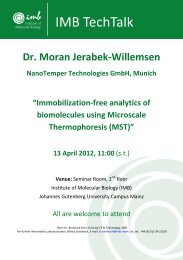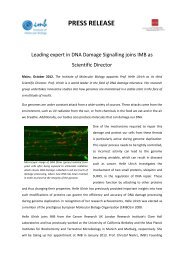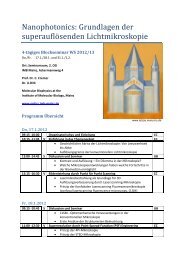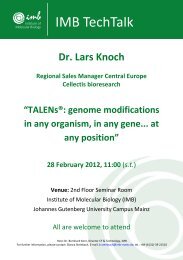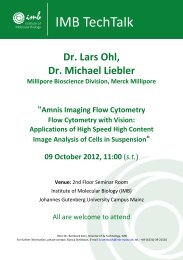Low-resolution PDF - IMB
Low-resolution PDF - IMB
Low-resolution PDF - IMB
Create successful ePaper yourself
Turn your PDF publications into a flip-book with our unique Google optimized e-Paper software.
R e s e a r c h a n d T r a i n i n g E n v i r o n m e n t<br />
Research and Training at <strong>IMB</strong><br />
40<br />
<strong>IMB</strong> is the place to be for scientists who want to carry out cuttingedge<br />
research in the fields of epigenetics, developmental biology,<br />
DNA repair and the interfaces between these fields. The research conducted<br />
by our multinational team of Group Leaders, postdocs and<br />
PhD students is vital to <strong>IMB</strong>’s work in addressing key questions within<br />
these areas.<br />
PhD students and postdocs at <strong>IMB</strong> are a key part of our research<br />
team and work on projects of fundamental biological importance or<br />
of relevance to human disease. Their research is conducted in a vibrant<br />
and highly interdisciplinary environment with leaders in the fields of<br />
epigenetics, DNA repair, developmental biology and systems biology.<br />
At <strong>IMB</strong> we make sure our scientists can work productively. A key part<br />
of the support we offer comes from our state-of-the-art Core Facilities.<br />
They provide services in bioinformatics, cytometry, histology, genomics<br />
and microscopy, and are staffed by experts who are there to advise<br />
and assist our scientists during each step of their experiments; from<br />
the initial conception to the analysis of data. As part of the dynamic<br />
International PhD Programme<br />
Our International PhD Programme on the “Dynamics of Gene Regulation,<br />
Epigenetics and DNA Damage Response” gives talented and<br />
enthusiastic students the opportunity to undertake PhD research at<br />
the cutting edge of modern biology.<br />
Our groups cover a broad range of expertise and include leading<br />
biochemists; geneticists; cell and developmental biologists who study<br />
the molecular mechanisms of embryonic development, ageing and<br />
disease; bioinformaticians and systems biologists who analyse highthroughput<br />
datasets and model regulatory gene networks; and applied<br />
physicists who develop ground breaking super-<strong>resolution</strong> microscopes.<br />
This range of expertise and the open and vibrant atmosphere<br />
within the Programme encourages multidisciplinary collaborations<br />
and innovative research.<br />
and collaborative spirit at <strong>IMB</strong>, all key equipment is shared between<br />
Research Groups and looked after by trained staff in the Core<br />
Facilities. This means our scientists will always have access to the most<br />
up-to-date and well maintained equipment that is required for their<br />
experiments.<br />
In addition to the training available through our Core Facilities,<br />
<strong>IMB</strong> has training programmes for both specialist scientific techniques<br />
and key transferable skills. The scientific training we provide includes<br />
courses on key topics such as statistics, the analysis of large datasets<br />
(including those generated by microarrays and next-generationsequencing<br />
methods) and advanced live and super-<strong>resolution</strong> microscopy.<br />
We also make sure our junior scientists learn the soft skills<br />
required for a successful career in an increasingly competitive scientific<br />
world both within and outside of academia. Courses we offer<br />
cover topics such as presentation skills, scientific writing and project<br />
management, as well as conflict management and leadership skills.<br />
The International PhD Programme therefore has a clearly defined<br />
and unique profile that provides students with interdisciplinary<br />
education in the following fields:<br />
• Epigenetics<br />
• Gene Regulation<br />
• DNA Repair<br />
• Functional Morphology of the Nucleus<br />
• Systems Biology and Bioinformatics<br />
The Programme is coordinated by <strong>IMB</strong> and participating groups are<br />
located at the:<br />
• Institute of Molecular Biology<br />
• Johannes Gutenberg University<br />
• University Medical Center<br />
• Max Planck Institute for Polymer Research<br />
www.imb-mainz.de/PhD<br />
International Summer School<br />
The <strong>IMB</strong> International Summer School (ISS) is a six-week programme<br />
for outstanding and enthusiastic undergraduate, Masters and PhD<br />
students who want to acquire excellent practical skills and hands-on<br />
training from leading scientists in molecular biology. Research Groups<br />
participating in the ISS include Group Leaders at <strong>IMB</strong>, Johannes<br />
Gutenberg University (JGU) and Mainz’ University Medical Centre.<br />
The International Summer School offers an attractive framework<br />
to improve the training of prospective scientists in an informal and<br />
international atmosphere. This includes theory modules (lectures and<br />
discussion groups) and practical research projects. Lectures by Group<br />
Leaders and external speakers give students comprehensive insight<br />
into the latest research findings and identify key open questions in<br />
Gene Regulation, Epigenetics and DNA Damage. Furthermore, the ISS<br />
teaches students the complementary skills, such as presentation and<br />
communication techniques, that are required for a successful career<br />
as a scientist.<br />
Beyond these specific events, ISS participants are also fully integrated<br />
into scientific life at <strong>IMB</strong> by participating in Lab Meetings and<br />
Journal Clubs. Furthermore, students work on a cutting-edge research<br />
project within the lab of one of the participating Research Groups.<br />
www.imb-mainz.de/ISS



